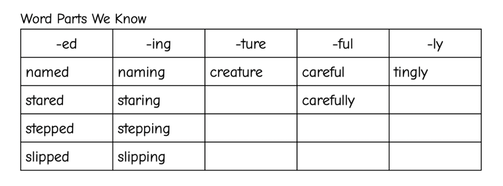 Well, it's nearly a new year, and in 2023 my resolutions are to do MORE of what I've been doing. More being the key word. This doesn't mean stagnation, but attempting to increase intentionality in everything I do. So what do I want more of? 1. More Morphemes Yes, I know it's a tongue twister. Morphemes are those meaningful word parts that allow English speakers to build upon a base word to create new words, such as carefully (care + ful + ly) or antidisestablishmentarianism (anti + dis + establish + ... well, you get the picture). Because English is just encrusted with words from many languages -- the way a tiara worn by Princess Kate* is encrusted with jewels -- English words may have bits and bobs from multiple sources, making it tricky for students to learn.. Explicit instruction in word parts supports students in both word reading and understanding word meanings (Carlisle 2010, in Manyak, Baumann, & Manyak 2018) In 2022: I added a morphemic element to the Word Previews my students do prior to reading. These previews have traditionally highlighted phonics patterns that students need to practice, culled from the pages they will be reading. This year, I built in more explicit instruction of word parts along with previews organized by morphemes (see example preview at right). In 2023: I plan to build more instruction of roots and affixes, building out our "Magical Morphemes" bulletin board so that it is a true resource for reading and understanding words (right now it is a sad little conglomeration of word cards.) As we read more nonfiction, I plan to strategically introduce roots that will support students in greater comprehension of science and social studies topics, building them into our Word Preview routine. 2. More Big Questions "Why were there so many rules?" Nadiia asked. Our small group had been reading about female scientists throughout history, and all of the women we read about chafed against the restrictions of their societies, whether in Germany (Maria Merian), England (Mary Anning), or India (Janaki Ammal.) The four girls in the group pondered what it would have been like to live in times when their lives were much more restricted than today, and the courage it took to "break the rules," as Aliyah put it. Generating questions is one of those strategies that the National Reading Panel (Shanahan, 2005) identified as supporting better comprehension. Too often, however, teachers are the ones who ask the questions. When we do, we limit students' attempts to understand, but we also limit their opportunities to make sense of the world, challenge the status quo, and engage more deeply in ways that matter to them. In 2022: I introduced the Cognitive Strategic Reading (CSR) routine (Klingner & Vaughn), which includes an after-reading question discussion. Students have been generating and discussing their own questions with lots of support. However, discussions have been somewhat cursory. In 2023: I plan to provide more explicit instruction on different types of questions, as well as strategies such as questioning the author or character. I also plan to build on their understanding of accountable talk to listen and respond to one another with more engagement. Students have the gist of the strategy, so it's time to go deeper. 3. More advocacy Currently, evidence-based reading instruction is a hot topic, thanks to the work of advocates and journalists, particularly Emily Hanford and Christopher Peak, who released the podcast Sold a Story this year. The podcast detailed how popular reading instructional methods fail many students. This has led to many a contentious Twitter convo and some real life drama in teacher's break rooms.. It has certainly led to some people being annoyed at me for my continued belief in continuously improving and adjusting our pedagogy to better align to research and to the needs of our students. (I know. Obviously I'm a monster.) In 2022: When several curriculum authors and professional development providers (many of whom profit from the methods discussed in the Sold a Story podcast) wrote a letter in response several teachers who have been acquainted on Twitter banded together to respond to the response... and then over 650 teachers and former teachers signed on to our letter. (A similar parent response received over 1300 signatures in support; there is A LOT of momentum for evidence-based instruction). Callie Lowenstein, who spearheaded our response letter, and I also contributed our thoughts to an article on the consequences of the pandemic on third grade readers. In 2023: I plan to revive this blog... during the pandemic, I admit, I didn't feel much like writing, and I wasn't in classrooms. However, after a year-and-a-half back in the classroom, I have plenty of thoughts on what it takes to put evidence into practice. I will always believe, in the end, that we have no excuse not to teach every child who is capable of reading, to be a skilled reader. It isn't beyond us. But it is a matter of having the will and the know-how to do so. *Kate wore said encrusted tiara to an event the same night Meghan Markle was told a tiara would be tacky. Coincidence? You decide!
0 Comments
|
Click the categories below for entries on specific topics.
AuthorCatlin Goodrow, M.A.T Archives
December 2022
Categories
All
|
 RSS Feed
RSS Feed
